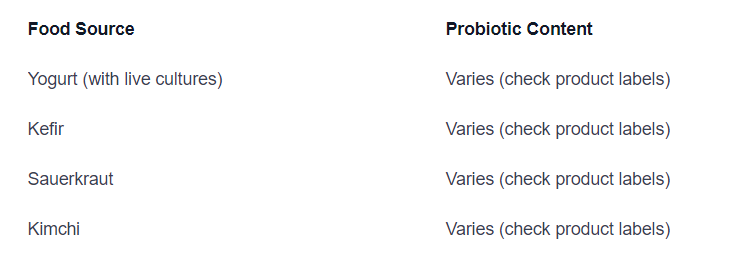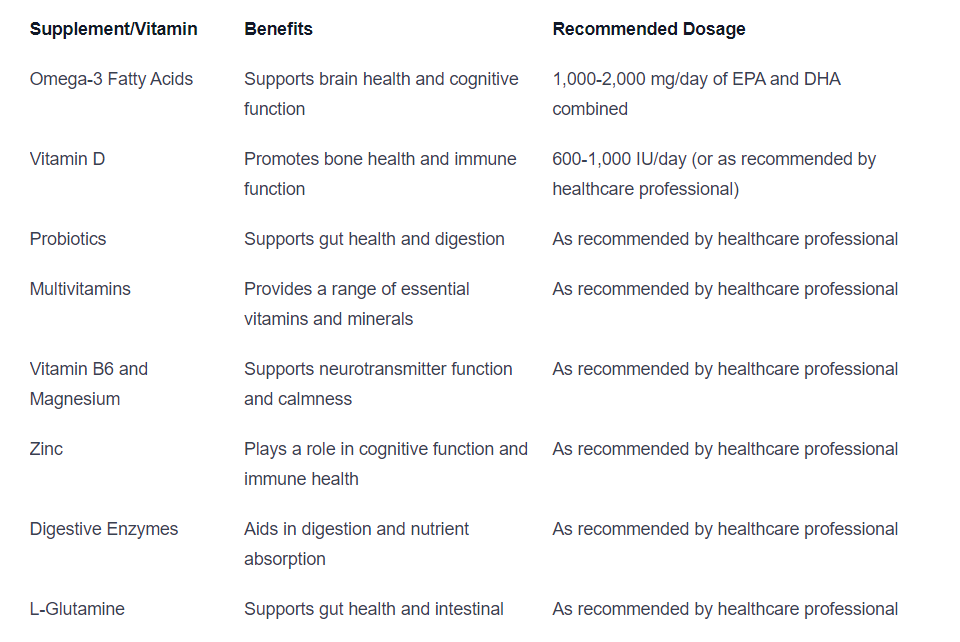Best Supplements and Vitamins for Autism
Discover the best supplements and vitamins for autism, supporting holistic care and optimal well-being.

Understanding Autism and Nutritional Support
When it comes to managing autism, a comprehensive approach that includes nutritional support can be beneficial. Understanding autism and the potential role of supplements and vitamins is key to optimizing the well-being of individuals with autism.

What is Autism?
Autism, also known as Autism Spectrum Disorder (ASD), is a neurodevelopmental condition that affects communication, social interaction, and behavior. It is characterized by a wide range of symptoms and challenges that vary from person to person. Some common signs of autism include difficulties with social interactions, repetitive behaviors, and sensory sensitivities.
The Role of Supplements and Vitamins in Autism Management
While there is no cure for autism, various interventions, including nutritional support, can help manage symptoms and improve overall health. Supplements and vitamins are often considered as part of a holistic approach to support individuals with autism.
Supplements and vitamins for autism management aim to address potential nutritional deficiencies and support optimal brain function. They are not meant to replace any prescribed treatments or therapies but can be used as a complementary approach.
By providing essential nutrients, these supplements and vitamins may help support various aspects of health, such as cognitive function, gut health, and overall well-being. It is important to note that the effectiveness of these supplements and vitamins may vary from person to person, and consultation with healthcare professionals is recommended.
In the following sections, we will explore some of the essential supplements for autism, how micronutrients can play a role, and the importance of nourishing gut health. Additionally, we will discuss the importance of working closely with healthcare professionals to develop personalized supplement and vitamin plans tailored to the specific needs of individuals with autism.
Essential Supplements for Autism
When it comes to managing autism, incorporating certain supplements and vitamins into a comprehensive treatment plan can be beneficial. Here, we highlight three essential supplements that have shown promise in supporting individuals with autism: omega-3 fatty acids, vitamin D, and probiotics.
Omega-3 Fatty Acids
Omega-3 fatty acids, particularly eicosapentaenoic acid (EPA) and docosahexaenoic acid (DHA), are essential fats that play a crucial role in brain health and development. Research suggests that supplementing with omega-3 fatty acids may have positive effects on certain behaviors associated with autism, such as hyperactivity, irritability, and social communication difficulties.
The following table provides an overview of common food sources rich in omega-3 fatty acids:

While dietary sources are important, some individuals may benefit from omega-3 fatty acid supplements to ensure an adequate intake of these essential fats. Before starting any supplementation, it is advisable to consult with a healthcare professional for personalized guidance.
Vitamin D
Vitamin D, often referred to as the "sunshine vitamin," is essential for overall health and plays a vital role in brain function. Studies have shown a potential link between vitamin D deficiency and autism spectrum disorders. Supplementing with vitamin D may help improve certain autism-related symptoms, such as social withdrawal and repetitive behaviors.
The following table provides an overview of common food sources rich in vitamin D:

While sunlight is an important source of vitamin D, some individuals may require supplementation, especially if they have limited sun exposure or live in regions with reduced sunlight during certain seasons. It is essential to consult with a healthcare professional to determine appropriate vitamin D supplementation based on individual needs.
Probiotics
Probiotics are beneficial bacteria that contribute to a healthy gut microbiome. Emerging research suggests a potential connection between gut health and autism symptoms. Supplementing with probiotics may help improve gastrointestinal issues and certain behavioral aspects associated with autism.
The following table provides an overview of common probiotic-rich food sources:

Probiotic supplements are available in various forms, including capsules, powders, and liquids. It is important to choose a high-quality product with specific strains of probiotics known to benefit gut health. As always, consulting with a healthcare professional is recommended to determine the most suitable probiotic supplementation approach for individuals with autism.
By incorporating these essential supplements into a comprehensive treatment plan, individuals with autism may potentially experience improvements in certain aspects of their condition. However, it's important to remember that each person is unique, and what works for one individual may not work for another. Consulting with healthcare professionals and following personalized guidance is key to finding the most effective supplement and vitamin approach for managing autism.
Supporting Micronutrient Levels
In addition to essential supplements, certain vitamins and minerals play a crucial role in supporting the overall well-being of individuals with autism. These micronutrients can help address specific nutritional deficiencies and promote optimal health. Let's explore three important ones: multivitamins, vitamin B6 and magnesium, and zinc.
Multivitamins
Multivitamins are a convenient way to ensure individuals with autism receive a wide range of essential vitamins and minerals. These supplements typically contain a combination of nutrients such as vitamins A, C, D, E, and various B vitamins, as well as minerals like zinc, selenium, and manganese.
While multivitamins are not a substitute for a balanced diet, they can help bridge the nutritional gaps that may exist in individuals with autism. It is important to choose a multivitamin specifically formulated for children or adults with autism, as these products often take into account unique nutritional needs.
Vitamin B6 and Magnesium
Vitamin B6 and magnesium are two nutrients that are often recommended together for individuals with autism. Vitamin B6, also known as pyridoxine, plays a crucial role in neurotransmitter synthesis, which can positively impact brain function and behavior. Magnesium, on the other hand, is involved in over 300 enzymatic reactions in the body and is known for its calming effects.
Supplementation with vitamin B6 and magnesium has been suggested to help improve certain behaviors associated with autism, such as irritability and hyperactivity. It's important to note that these nutrients should be taken in appropriate doses under the guidance of a healthcare professional, as excessive amounts can have adverse effects.
Zinc
Zinc is an essential mineral that plays a vital role in numerous physiological processes, including immune function, growth, and development. Studies have shown that individuals with autism may have lower zinc levels compared to their neurotypical peers. Supplementing with zinc may help address this deficiency and provide potential benefits for individuals with autism.
Zinc supplementation has been associated with improvements in social behavior, communication, and overall cognitive function in some individuals with autism. However, it is crucial to consult with a healthcare professional to determine the appropriate dosage and monitor zinc levels, as excessive zinc intake can interfere with the absorption of other essential minerals.
Including these micronutrients as part of a comprehensive nutritional approach for individuals with autism may help support their overall health and well-being. However, it's important to remember that each person is unique, and the effectiveness of these supplements may vary. Consulting with a healthcare professional is crucial to tailor a personalized supplement plan based on individual needs and nutritional status.
Nourishing Gut Health
When it comes to managing autism, nurturing gut health is an important aspect to consider. Certain supplements can support the digestive system and promote a healthy gut. In this section, we will explore two key supplements: digestive enzymes and L-glutamine.
Digestive Enzymes
Digestive enzymes are substances that help break down food into smaller, more easily digestible molecules. These enzymes are naturally produced by our bodies to aid in the digestion and absorption of nutrients. However, some individuals with autism may have deficiencies in certain enzymes, leading to digestive issues.
Supplementing with digestive enzymes can help support the breakdown of food and improve nutrient absorption. These enzymes assist in the digestion of proteins, carbohydrates, and fats, thereby reducing digestive discomfort and promoting a healthier gut.
It's important to note that the specific enzymes required may vary from person to person. Consulting with a healthcare professional can help determine the appropriate digestive enzyme supplement and dosage for an individual with autism.
L-Glutamine
L-glutamine, an amino acid, plays a crucial role in maintaining the health of the intestinal lining. It acts as a fuel source for the cells lining the digestive tract, helping to repair and rebuild the gut lining.
Individuals with autism may experience intestinal permeability, commonly known as "leaky gut," which can contribute to digestive problems and inflammation. Supplementing with L-glutamine can help support the integrity of the intestinal barrier, reducing the permeability and improving gut health.
While L-glutamine supplementation can be beneficial, it is important to consult with a healthcare professional to determine the appropriate dosage and duration for an individual with autism. They can assess the specific needs and potential interactions with any existing medications or supplements.
By incorporating digestive enzymes and L-glutamine into a comprehensive approach to autism management, individuals can support their gut health and potentially alleviate digestive issues. Remember, discussing these supplements with a healthcare professional and tailoring the approach to the individual's needs is essential for optimal results.
Consultation and Individualized Approach
Autism is a complex and diverse condition, and the nutritional needs of individuals with autism can vary greatly. Therefore, it is crucial to work with healthcare professionals who specialize in autism and have expertise in nutritional support. These professionals can provide valuable guidance and develop personalized supplement and vitamin plans tailored to the specific needs of each individual.
Working with Healthcare Professionals
When it comes to incorporating supplements and vitamins into the management of autism, it is important to consult with healthcare professionals who have experience in this area. These professionals may include pediatricians, nutritionists, dietitians, or naturopathic doctors who specialize in autism spectrum disorders.
Working with healthcare professionals allows for a comprehensive evaluation of an individual's nutritional status and specific needs. They can conduct thorough assessments, taking into account factors such as dietary habits, allergies, sensitivities, and any other medical conditions that may impact nutritional requirements.
By collaborating with healthcare professionals, individuals with autism and their caregivers can gain access to evidence-based information and recommendations. These professionals can guide them in making informed decisions about the appropriate supplements and vitamins to consider.
Personalized Supplement and Vitamin Plans
Each individual with autism has unique nutritional needs, which is why personalized supplement and vitamin plans are essential. Healthcare professionals can develop individualized plans based on factors such as age, overall health, specific symptoms, and any nutrient deficiencies identified through lab tests or assessments.
The table below outlines some common supplements and vitamins that may be considered for individuals with autism. However, it is important to note that these recommendations may vary depending on individual circumstances, and healthcare professionals should always be consulted for personalized advice.

It's important to remember that these supplements and vitamins are not a substitute for a balanced diet. They should be used as part of a holistic approach to autism management, including appropriate therapies, interventions, and support services.
By seeking consultation with healthcare professionals and developing personalized supplement and vitamin plans, individuals with autism can optimize their nutritional support and enhance their overall well-being.
Sources
https://www.abtaba.com/blog/supplements-vitamins-for-autism
https://www.verywellfamily.com/best-autism-supplements-7112614
https://www.angelsense.com/blog/supplements-and-vitamins-for-autism/
Similar articles
We’re here to help you

Our team is here to assist you in this process. Contact us for any assistance.
it’s easy to apply
We Accept Most Insurances
Our in-network insurance partnerships make ABA therapy more accessible to families throughout our service areas.







Our Insurance Process
We'll request your insurance details to help us verify your plan's coverage for ABA therapy. Once we've received this information, we'll walk you through your benefits, including copayments, deductibles and out-of-pocket maximums, so you know what to expect in advance.
Our team will then handle the preauthorization and all the necessary paperwork.
.svg)





















.jpeg)


































.jpeg)




.jpeg)







.jpeg)











.jpeg)
















